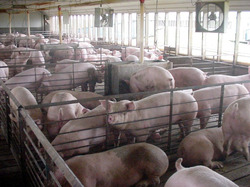Swine flu story illuminates disease and injustice breeding in factory farms' shadows
 The story we reported yesterday about bloggers' speculation that the swine flu epidemic sweeping the globe may have originated in a Mexican community that's home to massive industrial hog operations owned by Virginia-based Smithfield Foods has jumped to the mainstream media.
The story we reported yesterday about bloggers' speculation that the swine flu epidemic sweeping the globe may have originated in a Mexican community that's home to massive industrial hog operations owned by Virginia-based Smithfield Foods has jumped to the mainstream media.
The Associated Press reports today on claims by residents of La Gloria in the state of Veracruz that their community -- where a 4-year-old boy was among the first to test positive for the virus, a genetic mix of swine, bird and human flu -- is the "ground zero" for the outbreak that has sickened hundreds of people worldwide and killed more than 150 in Mexico alone:
As far back as late March, roughly one-sixth of the residents here in the Gulf Coast state of Veracruz began complaining of respiratory infections that they say can be traced to a farm that lies upwind five miles (8.5 kilometers) to the north, in the town of Xaltepec.
But Jose Luis Martinez, a 34-year-old resident of La Gloria, said he knew the minute he learned about the outbreak on the news and heard a description of the symptoms: fever, coughing, joint aches, severe headache and, in some cases, vomiting and diarrhea.
"When we saw it on the television, we said to ourselves, 'This is what we had,'" he said Monday. "It all came from here. ... The symptoms they are suffering are the same that we had here."
Granjas Carroll de Mexico, a half-owned subsidiary of Smithfield, operates eight hog farms in the area. The Mexican media has reported that health officials traced the La Gloria outbreak to a type of fly that reproduces in pig feces. But Smithfield denies the allegations, saying it's found no clinical signs of swine flu in its hogs or employees at its farms in Mexico.
Mexican agriculture officials also said yesterday that inspectors found no sign of swine flu among pigs around the suspected farm. However, the farm's manager told the AP that no one from the government inspected his facility for swine flu.
With the epidemic hurting its profits, the pork industry has asked health officials to rename the disease. However, the World Health Organization is sticking with the "swine flu" designation because the virus is the type that affects pigs, Bloomberg reports.
Back in Mexico, residents of La Gloria have long complained about conditions at the Smithfield subsidiary, saying they are bothered by foul odors, flies and problems with water contamination from the massive lagoons where hog waste is stored. After an outbreak of severe respiratory illness in February, health workers sealed off the town and sprayed chemicals to kill flies that were swarming in people's homes, the Times U.K. reports.
The Times also points out that the epidemic is likely fuel more controversy in Veracruz, home to thousands of farmers who claim the state stole their land in 1992. Now part of a movement called Los 400 Pueblos, the farmers -- most of them poor and many indigenous -- have become famous for their naked demonstrations in Mexico City. (For photos of the protests, click here.)
Regardless of whether health officials ultimately tie the swine flu epidemic back to Smithfield's hog operations in Mexico, the story has already helped illuminate how factory farms can act as a vector for environmental injustice, imposing suffering on nearby communities because of the serious ecological problems associated with industrial livestock operations.
It's a harsh reality that many residents of the United States are all too familiar with -- especially residents of the rural U.S. South, where such farming methods were first developed before being exported south of the border.
For example, a 2000 study by University of North Carolina epidemiologist Dr. Steve Wing and Gary Grant, an organizer with a grassroots community group based in rural North Carolina, found that industrial hog operations are concentrated in communities with high poverty rates and a high percentage of racial minorities. And a 2006 study by Wing and other researchers at UNC and RTI International found that students who attend schools near industrial swine operations suffer from more respiratory problems than students at other schools.
The people who work in such operations are also at risk of health problems, with the Centers for Disease Control and Prevention noting that they're susceptible to respiratory illnesses -- as well as to infections that can travel from animals to humans.
A report released last year by the Union of Concerned Scientists documented how misguided policies encouraged the growth of such dangerous industrial operations by shifting billions of dollars in costs to taxpayers and local communities -- and made the case for instituting new policies that support animal production methods that benefit society rather than harm it.
"CAFOs aren't the natural result of agricultural progress, nor are they the result of rational planning or market forces," said author Doug Gurian-Sherman. "Ill-advised policies created them, and it will take new policies to replace them with more sustainable, environmentally friendly production methods."
(Photo of factory hog farm from U.S. Geological Survey)
Tags
Sue Sturgis
Sue is the former editorial director of Facing South and the Institute for Southern Studies.
